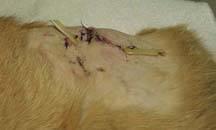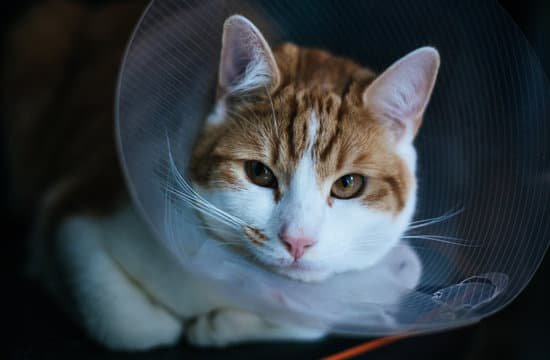Outdoor cats (particularly males) are prone to fighting and cat bites can lead to nasty skin abscesses. An abscess forms when an infected bite wound heals over on the surface, sealing the infection inside. Fever is generated as the infection incubates. Diseased tissue and the inflammatory cells liquefy into pus. The pus breaks through the overlying surface skin and drains, leading to foul odour, pain, and discharge. These abscesses usually require antibiotics.
What to Look for at Home
If you suspect your cat has an abscess look for a fluid-filled swelling sometimes near a small scab or tooth mark. The cat can also be feverish, listless and have a reduced appetite. Once the abscess ruptures a very smelly green or yellow discharge will be visible. Abscesses that aren’t healing can become thickened or the skin can become necrotic and die. Common areas for bite wound abscesses include the facial cheeks, the legs, and the base of the tail.
Treatment
- If the abscess has not ruptured, it will need to be lanced. Once the abscess is open, it will need to be flushed clean of infected debris. If the abscess is large or especially painful, sedation or a general anaesthetic will likely be required to accomplish this.
 Older abscesses may have enough devitalized overlying tissue to require surgical trimming and stitches. Some abscesses are large enough to require an indwelling rubber drain to assist with removal of the pus. You may have to flush the drain with disinfectant at home.
Older abscesses may have enough devitalized overlying tissue to require surgical trimming and stitches. Some abscesses are large enough to require an indwelling rubber drain to assist with removal of the pus. You may have to flush the drain with disinfectant at home.- The cat will absolutely need antibiotics at home. You will need to administer either pills or liquid medication (notify your veterinarian if you have a preference). Alternatively, there is an injectable antibiotic (Convenia) which lasts 2 weeks. If this is employed, additional oral medication is generally not necessary.
- Pain relief (liquid or oral) may be dispensed if the area is tender or the abscess was large.
- Warm compresses are helpful for the first few days following discharge. The heat helps liquefy diseased tissues so that they can drain. To hot pack the area, use a warm (not hot) washcloth applied to the wound for 5 to 10 minutes once or twice a day.
Other Important Things
Feline leukemia (FeLV) and feline immunodeficiency (FIV) viruses represent serious contagious infections spread by bite wounds. Tests are available to determine if your cat has one of these diseases. This test will not rule out any infection initiated by this bite but will test for any infection from past bites.
Most abscesses heal over the course of a week, though larger abscesses can take longer. If your cat’s abscess is not healed in one week, be sure to notify your veterinarian. Be sure you understand how to give medication, perform hot packing, and manage rubber drains if your pet has them.



